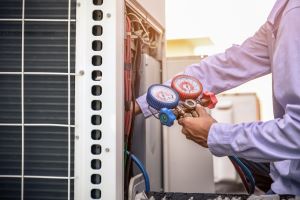Schedule Your System Inspection Today with DMAKS HVAC Experts.
Schedule Your System Inspection Today with DMAKS HVAC Experts.
Blog Article
Energy-Efficient HVAC Equipments to Minimize Utility Costs
As power costs proceed to increase, the importance of energy-efficient HVAC systems becomes significantly apparent. These systems not just assure significant cost savings on utility costs but likewise add to a more lasting future by lessening energy intake. With different alternatives available, including geothermal heatpump and ductless mini-splits, residential property owners face a plethora of selections that can boost comfort and air quality. Nonetheless, recognizing the essential features and maintenance needs is necessary to optimizing these benefits. What elements should be prioritized when choosing the right system for your demands?
Benefits of Energy-Efficient Heating And Cooling Equipments
Energy-efficient HVAC systems use numerous advantages that expand beyond plain price financial savings. By consuming less power, these systems contribute to decrease greenhouse gas emissions, aiding to deal with climate change and promote sustainability.
In addition, energy-efficient a/c systems often provide improved comfort levels. A lot of these systems feature advanced modern technology that permits better temperature control and enhanced air high quality (DMAKS HVAC). This results in a much healthier interior setting, which is particularly vital for individuals with allergies or breathing issues
In addition, spending in energy-efficient HVAC systems can enhance home value. As even more consumers prioritize energy effectiveness, homes and buildings outfitted with these systems may draw in greater proposals in the genuine estate market.
Kinds of Energy-Efficient A/c Options
Just how can house owners and organizations pick the most ideal energy-efficient a/c choices for their needs? The marketplace supplies a range of energy-efficient cooling and heating systems, each created to enhance convenience while minimizing power consumption.
One choice is the variable refrigerant flow (VRF) system, which successfully controls the temperature in several zones within a structure. This system adapts its refrigerant circulation to match the preferred temperature level, causing considerable power savings.
Another preferred selection is geothermal heatpump, which use the earth's secure temperature level to heat and cool rooms. By moving heat to and from the ground, these systems demonstrate remarkable efficiency, specifically in modest environments.
Additionally, ductless mini-split systems offer an energy-efficient alternative for homes lacking ductwork. These systems permit for zone-specific heating and cooling, lowering power waste in unoccupied areas.
Finally, high-efficiency heaters and a/c unit, with innovative SEER and AFUE scores, provide reliable environment control while eating much less energy than typical designs. By examining these choices, homeowners and organizations can select a HVAC system customized to their certain requirements and energy performance goals.
Trick Attributes to Think About

Next, investigate the kind of compressor used in the system. DMAKS HVAC. Variable-speed compressors can change their output to match the heating or cooling down need, bring about enhanced convenience and energy financial savings compared to single-speed designs. Furthermore, try to find systems equipped with clever thermostats that provide programmable settings and remote gain access to, permitting better control over power intake
One more crucial feature is the system's air purification ability. High-efficiency filters can improve indoor air high quality and lower power consumption by ensuring the system operates effectively. Take into consideration the kind of refrigerant used; contemporary systems usually use green cooling agents that have a lower ecological influence.
Lastly, make certain that the system works with zoning innovation, which permits customized temperature control in different areas of your home, improving comfort while decreasing power usage.
Tips for Choosing the Right System


Following, take into consideration energy performance ratings, specifically the Seasonal Power Efficiency Ratio (SEER) for cooling down systems and the Yearly Gas Usage Performance (AFUE) for furnace. Greater scores show greater effectiveness, which can bring about significant savings on energy bills gradually.
In addition, evaluate the sort of HVAC system that ideal suits your way of living and budget. Options include air conditioning, ductless mini-splits, and heatpump, each with its own collection of benefits and downsides.
Don't overlook the value of appropriate installation and sizing; an improperly sized system can cause inadequacies and enhanced wear. Lastly, speak with a specialist HVAC service provider to get professional suggestions customized to your home's distinct needs. This thorough approach will certainly ensure that you select an energy-efficient cooling and heating system that satisfies your requirements and spending plan properly.
Maintenance for Optimal Efficiency
When the best HVAC system is in place, continuous upkeep becomes vital to making certain optimum performance and long life. A well-maintained system operates better, resulting in lower power usage and minimized utility expenses. Regular evaluations and tune-ups must news be scheduled at the very least twice a year-- once prior to the cooling period and once before the heating period.

Homeowners should also be alert concerning monitoring their a/c system's efficiency. Uncommon noises, varying temperatures, or increased energy expenses can show underlying concerns that require instant attention. By resolving these issues quickly, home owners can avoid expensive fixings and prolong the life expectancy of their systems.
Purchasing a maintenance plan with a qualified specialist not only improves efficiency but likewise supplies assurance, recognizing that the system is running at its best. DMAKS HVAC. Regular maintenance is for that reason important for maintaining power effectiveness and decreasing overall functional prices
Final Thought
To conclude, energy-efficient cooling and heating systems present a feasible option for lowering energy bills while enhancing comfort and air quality. By including sophisticated technologies and options such as geothermal heatpump and ductless anchor mini-splits, homeowner can attain substantial power savings and add to environmental sustainability. Cautious consideration of system functions and ongoing upkeep better guarantees ideal efficiency, making energy-efficient systems a prudent investment for both economic and eco-friendly benefits.
Report this page